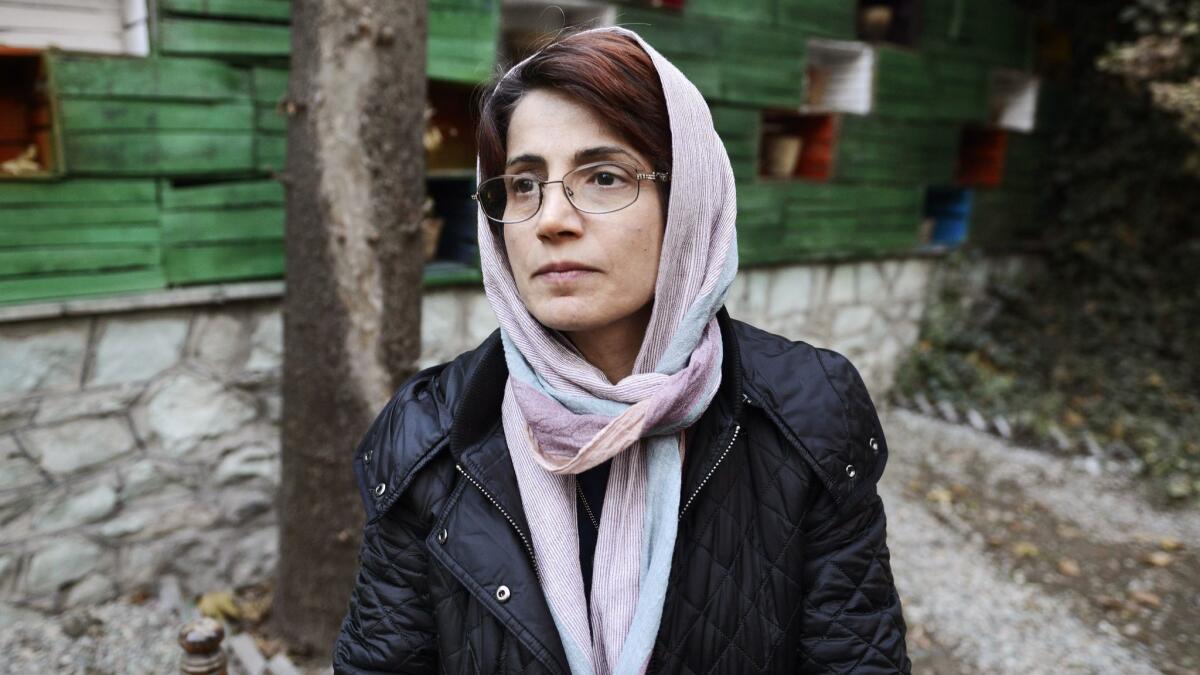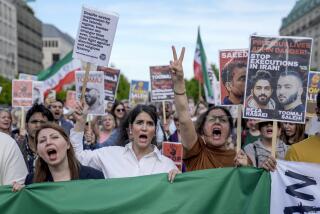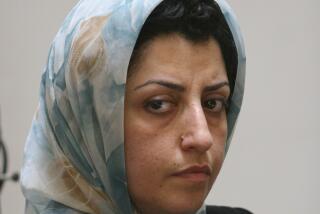Iran sentences human rights lawyer to 38 years in prison — and 148 lashes

- Share via
A prominent Iranian lawyer who defended women arrested for protesting the country’s mandatory head scarf law has been sentenced to a total of 38 years in prison and 148 lashes, according to her husband.
Nasrin Sotoudeh, who has been imprisoned since being taken from her home in June, is already serving a five-year sentence.
The 55-year-old human rights lawyer was sentenced to an additional 33 years — and the 148 lashes — after being convicted of several more national security crimes this month, her husband, Reza Khandan, wrote on Facebook on Monday.
But the semiofficial Islamic Republic News Agency reported that a judge at Tehran’s Revolutionary Court said Monday that in addition to the five years of Sotoudeh’s earlier sentence for “colluding against the system,” she was sentenced to two years for “insulting” supreme leader Ayatollah Ali Khamenei. The report did not clarify which cases the judge spoke of, but a rights group said one appeared to be the 2015 conviction.
Sotoudeh told her husband in a brief phone call from prison that she was informed she faces 38 years and the lashes, according to the Center for Human Rights in Iran.
Khandan told the New York-based advocacy group that it is unclear what additional charges Sotoudeh had been convicted of and that his wife had not received the verdict in writing.
“I don’t know how many years she got for each of the charges because my conversation with Nasrin only lasted a few minutes and we didn’t get to the details,” Khandan said, according to a statement on the group’s website.
“I only know that the biggest sentence was 12 years for [encouraging] ‘corruption and prostitution,’” he said, according to the Center for Human Rights in Iran.
Hadi Ghaemi, the center’s executive director, said lashing is an unusual sentence for someone charged in a security case. He said it showed Iran is escalating its crackdown on human rights defenders.
“Sotoudeh is asking for rule of law. It shows how much [authorities] are afraid of her,” Ghaemi said in an interview Tuesday.
Human rights groups and lawmakers denounced Sotoudeh’s sentencing.
“Sotoudeh must be released immediately and unconditionally and this obscene sentence quashed without delay,” said Philip Luther of Amnesty International.
The U.S. State Department also demanded her release and called the sentence “barbaric.” The European Union released a statement demanding authorities review Sotoudeh’s sentence and ensure her right to appeal. The European Parliament awarded Sotoudeh the prestigious Sakharov Prize for Freedom of Thought in 2012.
“The European Union notes that the right to protest peacefully, as well as the right to express opinion in a non-violent manner, are cornerstones of the International Covenant on Civil and Political Rights, to which Iran is a party,” the statement read.
In the decade following Iran’s disputed 2009 presidential election, more than 40 lawyers who defend political activists have been arrested.
But the Iranian judiciary intensified its clampdown in January 2018 after the country was rattled by its biggest anti-government protest in nearly a decade. The protests were set off after a woman was arrested in Tehran for removing her head scarf in public.
After the wave of unrest, authorities arrested at least seven human rights attorneys, including Sotoudeh, and announced that defendants held on political charges are only able to choose lawyers from an approved list.
Human rights lawyer Mohammad Najafi was sentenced in October 2018 to three years in prison and 74 lashes for “publishing falsehoods” and “disturbing the state.”
This isn’t the first time Sotoudeh has been imprisoned. She was arrested in 2010 for what Iran said was “spreading propaganda against the system.”
Sotoudeh was kept in solitary confinement during some of her time in prison and reportedly went on a hunger strike in October 2012 to protest how authorities were treating her family and for being denied the opportunity to see her daughter and son. She was released in 2013 when President Hassan Rouhani granted her a pardon.
More to Read
Sign up for Essential California
The most important California stories and recommendations in your inbox every morning.
You may occasionally receive promotional content from the Los Angeles Times.











